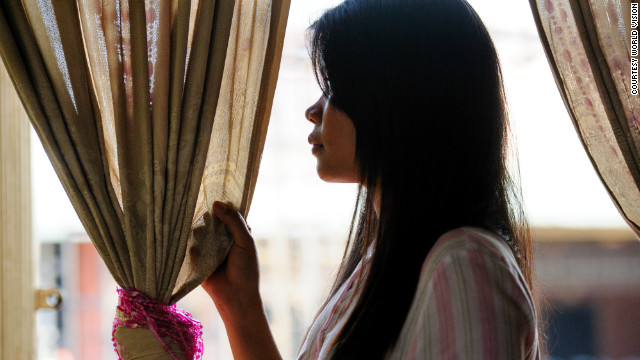Ruse (below) spent three years in a Cambodian brothel before being rescued.
April 23rd, 2012
The CNN Freedom Project
Editor's note: Richard Stearns is the author of
“The Hole in Our Gospel” and president of the U.S. office of World
Vision, a Christian humanitarian organization dedicated to working with
children, families and their communities worldwide to reach their full
potential by tackling the causes of poverty and injustice. Follow
Stearns on Twitter @RichStearns. The opinions expressed in this commentary are solely those of Richard Stearns.
By Richard Stearns, special to CNN
This February, I visited Cambodia, where my heart was broken by the
evils of the sex trade in that country. Too often there is an acceptance
of prostitution that leads to a male culture that believes sex with
virgins improves health has created an epidemic of young girls and boys
trafficked into the cities. Roughly 30,000 young women and men in that
country (some estimates are as high as 100,000) are trapped in slavery.
When imprisoned in the brothels, these young women and men serve roughly
700 people every year.
I interviewed a young woman named Ruse (not her real name) who had
spent three years in a Cambodian brothel before being rescued and sent
to World Vision’s Trauma Recovery Center in Phnom Penh.
Ruse’s story was heartbreaking. Her family was extremely poor, and
when she was just 13, her mother became very ill and needed medical
attention. Her father had left, and she had two smaller siblings as
well. The family desperately needed money. Ruse told me, “My virginity
was the most valuable possession my family had.”
The life Ruse led for the next three years defies all sense of human
dignity. She was originally sold for $400 and then found herself captive
in a brothel. Ultimately, a police raid set her free, and World Vision
was able to help her with psychological recovery and job training. Today
Ruse has a small apartment and a job as a nanny.
The suffering of Ruse and tens of thousands like her needs to end.
However, the U.S. Congress is stalling on a bill that would go a long
way toward locking up those who buy and sell human beings as well as
preventing trafficking and providing treatment to its victims.
The centerpiece of American action opposing modern day slavery is the
Trafficking Victims Protection Act (TVPA). The bill helps and
encourages governments like Cambodia’s to toughen laws against
traffickers — including prosecuting here in the United States any
American citizen who sexually exploits a child overseas. An innovative
feature of the Senate version of the bill is that it allows the U.S. to
partner with NGOs and foreign governments to achieve the greatest
possible impact. World Vision works in Cambodian villages were
trafficking is a huge problem, and we educate parents, teachers and
children on the dangers of this trade in human beings and how they can
prevent it.
This important bill must be renewed every few years to respond to the
changing ways of traffickers. It has always been bipartisan and has
always passed Congress unanimously. However, the law has been allowed
to expire in Congress, and efforts to pass it have been bogged down by
partisan games. With the failure of Congress to prioritize the fight
against modern-day slavery, millions of children around the world, just
like Ruse, and even children here in the U.S., are without the
protection that has traditionally been offered by our government.
The bickering began last fall when the U.S. Department of Health and
Human Services pulled funding from the U.S. Conference of Catholic
Bishops, which had been contracted to provide services to victims of
trafficking here in the United States. The resulting argument about
access of faith-based organizations to government funding is an
important one. But Congress’s inability to solve that debate should not
mean that we look the other way while human beings, like Ruse, are
bought and sold as commodities.
In conjunction with the International Justice Mission (IJM), the
Polaris Project and Safe Horizons, World Vision is asking supporters in
the U.S. to join a social media campaign against human trafficking and help move this legislation forward.
From now until the end of April, we urge people to call their senators or use Twitter with the hashtag #endslavery to get more senators to sponsor the bill.


1 comment:
Recovery from birth trauma and for nerve related injuries to mom during birth or pregnancy is important.
Post a Comment